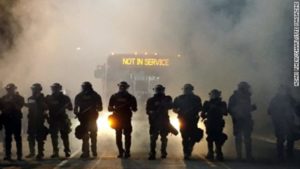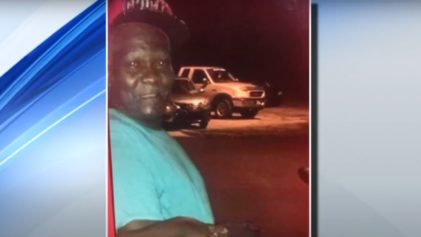
An image taken By Adam Rhew of Charlotte magazine during street protests following the shooting death of Keith Lamont Scott
Last week, the district attorney’s office in Los Angeles announced that they will not prosecute two officers who shot and killed a young Black man, Ezell Ford, in 2014. A year after the shooting, the city’s civilian Police Commission ruled that one of the officers had violated police department policy. However, it took the prosecutor another year and a half after that to decide that forensic evidence supported the police officers familiar story that they felt their lives were in danger.
According to the Los Angeles Times, “The Los Angeles County District Attorney’s Office has not charged a law enforcement officer in an on-duty shooting since 2000, records show.” This follows a national pattern. In an analysis conducted by The Washington Post and Bowling Green State University, it was found that, “Among the thousands of fatal shootings at the hands of police since 2005, only 54 officers have been charged.”
Over the past eight years, when local district attorneys have refused to pursue criminal charges against police officers accused of excessive force, attorneys and activists have looked toward the federal government for possible action. But on his first day in office, Donald Trump made it clear that these groups need not waste their time looking for his administration to get involved.
Within seconds of Trump being sworn into office, the White House website was edited to replace the civil rights page with one titled “Standing Up for Our Law Enforcement Community.” The page states, “The dangerous anti-police atmosphere in America is wrong,” which masterfully assumes that such an atmosphere exists (it doesn’t), while suggesting that police will be empowered to do whatever necessary to counteract that “atmosphere.”
Trump’s stance is in stark contrast to the Obama administration, which, during its eight years, launched 25 investigations into the practices of police departments across the country, more than any other recent administration. Such investigations raise awareness, reveal useful data on police practices and sometimes result in consent decrees that require department-wide changes.
However, it’s not clear what long-term impact the decrees have. In a report conducted by The Washington Post and the PBS series “Frontline,” it was revealed that, “In five of the 10 police departments for which sufficient data was provided, use of force by officers increased during and after the agreements. In five others, it stayed the same or declined.”
But the biggest criticism of all is that in spite of the investigations and consent decrees, what was really needed from the Obama administration was actual federal indictments of police officers responsible for killing Black men and women. Federal charges would have sent the strongest message that Black lives truly matter.
The Obama administration’s failure to pursue charges follows a familiar pattern of the Department of Justice deciding not to bring federal civil rights charges against officers. Last year, in an investigation that included not only deaths but other cases as well, Pittsburgh-based The Tribune-Review found that “federal prosecutors declined to pursue civil rights allegations against law enforcement officers 96 percent of the time since 1995.”
Moving forward, what’s clear is that under the Trump administration not only will federal prosecutions of police officers be off the table, but investigations of police departments and consent decrees requiring systemic change are no longer an option. During his confirmation hearing, Jeff Sessions, Trump’s nominee for Attorney General, testified that such consent decrees “undermine respect” for police officers and that he feels law enforcement has been “unfairly maligned” by political leaders (e.g., Obama) who have suggested the need for such investigations.
Moreover, on Inauguration Day, at around the same time the Trump administration was revising the White House website, the Department of Justice requested to delay a court hearing regarding the consent decree signed with the city of Baltimore, sowing fear that the DOJ may be looking to cancel the agreement completely.
So, in an era where absolutely no support will be coming from the federal government, what are the options for community groups seeking to challenge police violence?
One strategy is to organize patrols to monitor the police before and during incidents with community members. In the late 1960s and ’70s, the Black Panther Party engaged in such efforts, making full use of their right to bear arms openly. For the past two decades, several groups and coalitions around the country have revisited this strategy, especially in New York. As stated by the Peoples’ Justice Coalition, an alliance that includes the Malcolm X Grassroots Movement, the Justice Committee and others, “Today, our cameras are our weapons and our work draws on the legacy of the Panthers.”
While the above strategy seeks to change policing from outside the political process, other strategies involve seeking change from within the system. Such an option involves seeking to replace local elected offices that are connected to issues of police violence. In many cities and counties, such an electoral strategy will require building new, independent political organizations distinct from the traditional party structures. Mainstream party politics generally produces mainstream candidates, candidates safe enough to gain approval from party gatekeepers and to raise the funds needed to campaign. Even in municipal elections, which are often technically “nonpartisan,” the process is still dominated by party influence. The platform of the Movement for Black Lives includes a demand for “independent Black political power and Black self-determination in all areas of society.”
This strategy has been a staple of the past civil rights era. The Student Nonviolent Coordinating Committee (SNCC) joined with local residents to create the Lowndes County Freedom Organization in the mid-1960s. Several years ago, in Selma, Alabama, a Black-led grassroots effort utilizing the same state laws SNCC used started the Freedom Party as a third-party apparatus. Implementing such a strategy on a wider level will require detailed research on county and state ballot access requirements.
And finally, if we are to truly address the fundamental relationship between the police and our communities, we must address our overall socioeconomic status in this society. Several studies have pointed out that, while there is obviously a strong racial component to police shootings, there is an economic component as well. Police shoot Black people more, in part, because they over-police lower-income communities. One report, conducted by the Economic Policy Institute in the aftermath of the Michael Brown shooting, identified the many ways that public policy has supported segregation in Ferguson, Missouri, thereby facilitating oppressive policing.
With this in mind, the focus on economic justice, which is included in the Movement for Black Lives platform, is a welcome and critically important step. While some of the recommended actions in the platform are directed at the federal and state level — both of which are highly unreliable right now — it includes several suggested local actions Black communities can take on. And at an individual level, no policy is needed to implement the most basic step to building Black economic power: Buy black.
In short, while we should never cease to demand justice from the government that we pay for, we must increase our efforts at pursuing independent strategies. Luckily, we have a wealth of strategies right in front of our faces. Now, they just need to be carried out.


